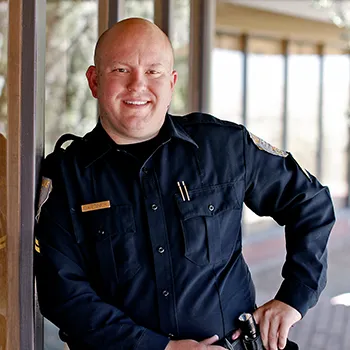
Jeannine Johns’ law enforcement education began with an interest in horticulture. Like one-third of all U.S. undergraduates who change their major at least once during college, Johns started at the University of California-Riverside (UCR) as a horticulture major but eventually settled on a degree in sociology. It was a sociology professor who initially suggested that law enforcement might be a good fit for her. Johns is now a detective with the El Cajon Police Department in southern California.
After finishing at UCR, Johns initially got a job as a probation officer before eventually graduating from the police academy, working as a patrol officer and school resource officer, and finally making detective in January 2018. While she was working as a patrol officer, Johns continued her law enforcement education with a Master of Science in Organizational Leadership from National University (NU). She received a scholarship for police officers in the form of a tuition discount for her graduate program.
While a master’s degree wasn’t required for Johns to do her job, it did come with a pay raise and an opportunity to move up the ranks. “I was able to get my advanced post two years sooner than someone without their master’s degree,” Johns says. “As far as promotability, it has definitely given me a lot of opportunities. I’ve only been working as a police officer for seven-and-a-half years, and I just got promoted to a detective spot.”
According to Johns, her program in organizational leadership has translated well into law enforcement. It also gives her options should she ever want to switch careers. “Police agencies are now very much structured like larger organizations. Having a business background gives you a foundation that applies to any type of business, whether it’s a municipality, like I work for, or a bigger agency like a sheriff’s department,” she explains.
Johns says that her agency recognizes the value of further law enforcement education. “Now I’m seeing the benefits of getting my master’s degree. It was definitely the best career move I could have made. As I promote further, they want to see that additional education on top of our [police academy training],” she says.
Johns’ law enforcement career has allowed her to pursue a number of unique opportunities within the police department. “The different things that I’ve gotten to do as a police officer go beyond just going out there and responding to a radio call. I’m a cadet advisor, so I mentor people who want to be in law enforcement. I run a teen police academy for youth who are in high-risk situations, but still feel that law enforcement might be a fulfilling career,” she says. “There’s so much more other than going out and chasing bad guys. There’s just so many different little niches that you can get involved with within your law enforcement community, depending on what agency you work for and the opportunities that present themselves.”
Careers in Law Enforcement
There are a number of career options available in the myriad of organizations and agencies operating within the law enforcement field, ranging from state and local police to federal agencies such as the Federal Bureau of Investigation (FBI) and the Drug Enforcement Agency (DEA).
If you are considering a career in law enforcement, one distinction to understand is the difference between sworn and non-sworn positions. Sworn officers have a badge, carry a firearm, and have the ability to arrest suspects. Patrol officers, detectives, sheriffs, state troopers, and federal agents are all sworn officers. Non-sworn positions include correctional officers, dispatchers, crime scene technicians, and lab personnel. Johns, for example, began her law enforcement career as a non-sworn probation officer before graduating from the police academy and becoming a sworn police officer.
The career outlook for jobs in law enforcement is positive. According to the Bureau of Labor Statistics, jobs for police and detectives are expected to grow by 7 percent between 2016 and 2026. The median pay nationally in 2017 was $62,960. California leads the country in the number of law enforcement jobs, employing nearly 73,000 sheriffs and police patrol officers. The 2017 annual mean wage for law enforcement professionals in California was $100,090 and the hourly mean wage was $48.12.
How to Become a Police Officer

The minimum requirement to become a police officer is a high school diploma. Some departments require some college coursework or an associate degree. While having a bachelor’s degree or other advanced law enforcement education is not a requirement for officers to begin their careers at local departments, additional education is important for anyone interested in pursuing supervisory positions or teaching at the police academy. Most federal positions at agencies such as the FBI and CIA require a bachelor’s degree and additional training. Many non-sworn positions that need specialized technical knowledge, such as crime scene technicians, also require post-secondary credentials. Desirable skills for all law enforcement positions include communication, empathy, leadership, perceptiveness, problem-solving, and physical stamina and strength.
Regardless of whether you hold a high school diploma or a doctoral degree, if you want to become a sworn officer you also have to graduate from the police academy. Prior higher education will not only make you a more attractive academy recruit, it will also help you succeed in your police academy training.
Jonathan Lowe, a sergeant with the San Diego Police Department who works as a recruiting officer, says the police force is looking for well-rounded applicants. “We want somebody who has some schooling, military, or life experience. You don’t have to have a college degree, but it helps; that’s one less worry for us because the police academy is college-level material. If you have a degree, you’re going to pass the academy,” he says.
To get into the police academy, candidates usually have to pass a physical test, written exam, and criminal background check. Johns says that in California, the police academy is a 29-week program that teaches students the basics of being a police officer.
After graduating from the academy, new hires have a probationary period and then spend several years working as a patrol officer. “Everybody starts in patrol, because that’s where you learn the foundation of dealing with crime scenes and interacting with victims, witnesses, and suspects. How do you become a detective if you’ve never interviewed somebody on the street?” Lowe asks.
“Then as you advance in your career, you can become a detective. The police departments [in cities like San Diego] are so large that we have every different type of detective bureau that you can think of. Whether it’s domestic violence, human trafficking, homicide, robbery, or gangs. So whatever interests a person, there’s probably something for them on the law enforcement side.”
Bachelor’s Degrees Are Becoming Increasingly Common Among Law Enforcement
While not a requirement for the job, it’s becoming increasingly common to see law enforcement officers with two- or four-year degrees. A November 2017 study from California State University-Fullerton(CSU Fullerton) and the Police Foundation found that more than half (51.8 percent) of sworn officers in the United States have at least a two-year degree, 30.2 percent have at least a four-year degree, and 5.4 percent have a graduate degree. The report notes that there is significant variation across states and agency size, among other factors. In California, which is one of the states with the highest percentage of officers with four-year degrees or higher, 39.5 percent of police officers have a bachelor’s degree. Lowe says that around 70 percent of police officers hired by the San Diego Police Department have at least an associate degree or the equivalent 60 college credits.
According to the Police Foundation, almost three-quarters of agencies pay officers an extra 1-7.49 percent for having a bachelor’s degree. Most agencies pay officers 1-2.49 percent more for a four-year degree than an associate degree or high school diploma. In addition, a college degree can be highly important for promotion, especially at the rank of lieutenant and above.
Johns says that she is able to make good use of her law enforcement education during job interviews. “In every interview you ever go on in law enforcement, they will ask you: ‘What is your training and experience?’ And every single time I use my training experience and what I’ve learned as a police officer, but also my background in having my bachelor’s in sociology and my master’s in organizational leadership. It’s definitely a driving point in police interviews that you have your degrees instead of just the basic [police academy training],” Johns explains.
Agency Incentives for Continuing Education
Some officers are able to pursue bachelors or more advanced degrees while on the job due to funding provided by their agencies, as well as scholarships for police and other law enforcement professionals offered by higher education institutions. According to the Police Foundation, more than half of law enforcement agencies provide employees at least one incentive to pursue higher education. The most popular incentives are tuition assistance and reimbursement and educational pay incentives. The San Diego Police Department, for example, offers up to $2,000 per year towards continuing education.
Lowe himself was able to combine his law enforcement career with his law enforcement education. After graduating with an associate degree from Grossmont Community College, he joined the police force. He was then able to earn both a bachelor’s in criminal justice and a master’s in forensics from National University while working full-time. Lowe received a law enforcement scholarship from NU that allowed him to pursue both degrees. The format of the criminal justice program involves one intensive class at a time, which allows adult learners with already busy schedules a great deal more flexibility.
Lowe says that his law enforcement education helped improve his writing and communication skills, which are invaluable in his day-to-day work as a police officer. A large part of a police officer’s job entails writing reports. “That’s the unglamorous side of this job that they don’t show on TV. You might make a great arrest, but there has a be a great report to follow up or else the guy gets let go,” he explains.
“Written communication is especially important in this job,” he adds, “particularly the ability to write clear, concise, detailed police reports.”
The Police Foundation confirms this, finding that two perceived benefits of higher education for law enforcement is that college-educated officers are better report writers and better able to use modern technology.
Another area where having a four-year degree is important is being able to train other officers. “I also teach at the police academy, which is a specialty where you have to have a college education,” Lowe says, adding that having a degree also gave him a higher salary at the police academy.
Law Enforcement Scholarships
Universities across the country are also increasingly recognizing the importance of providing educational opportunities for law enforcement. National University’s Law Enforcement Scholarship, for example, is intended for employees of law enforcement agencies across the United States who have the goal of earning an associate, bachelor’s, or master’s degree or academic certification. The award will cover 25 percent of tuition, up to $16,500, for approved coursework. The scholarship can be used towards programs on National University’s campus in Los Angeles or for an online degree.
The law enforcement scholarship also covers up to $6,500 in tuition for approved coursework for dependents of qualified law enforcement agency employees. Examples of agencies with eligible employees include police departments, sheriff’s departments, highway patrol, the FBI, U.S. Customs and Border Protection, departments of corrections, and offices of juvenile justice.
National University has also recently recognized the rigor of the training provided at police academies in an effort to recruit more police officers. In the Bachelor of Science in Criminal Justice Administration program, for example, the NU registrar will grant credit for seven elective classes to anyone who has graduated from one of California’s accredited police academies.
According to James Guffey, professor and former academic program director of NU’s Bachelor of Science in Criminal Justice Administration, law enforcement professionals who have an associate’s degree and graduate from a police academy, should be able to complete the remaining 10 core courses required for their bachelor’s degree in about a year-and-a-half. The credits from the police academy training, combined with the law enforcement scholarship, make the bachelor’s in criminal justice degree an affordable option for law enforcement professionals.
The National University criminal justice department is currently looking at ways to accept credit from police academies outside of the state of California, as well recognize the experience that professionals in related fields such as probation and corrections gain in their training.
Law Enforcement Education at National University
Criminal justice seems like the most obvious educational pathway for someone interested in a career in law enforcement, but it’s not the only applicable major. A 2015 study from Michigan State University (MSU) surveyed seven medium-sized to large police departments across the United States. Forty-five percent of officers had a four-year degree, and about half of those had studied criminal justice.
As a law enforcement university, NU offers a number of related undergraduate programs, in addition to criminal justice administration: pre-law, public administration, cybersecurity, and homeland security and emergency management. In addition, graduate students can earn master’s degrees in criminal justice, forensic sciences, public administration, cybersecurity and information assurance, homeland security and emergency management, and juvenile justice. Beyond programs that are specific to various branches of law enforcement, students also might consider majors such as psychology and sociology. Online degrees are available for most of NU’s programs.
Guffey says that many of the faculty members teaching in NU’s criminal justice administration program have several years of experience in law enforcement. Not only do they have on-the-job experience, they also are experienced in providing training to their law enforcement colleagues. Students benefit from learning about a professor’s experience in the field. “You’ve got courses like Principles of Investigation and Leadership and Management in Criminal Justice, which are really very practical in nature,” he says.

Guffey adds that a criminal justice degree will give students a leg up at the police academy: “The police academy is pretty intense. You’re going to fare better on those tests. You’re going to be able to write better reports, understand what you’re writing, and what crime you’re faced with on the street. All of those things are going to be stressed in a bachelor’s in criminal justice.”
Lowe’s bachelor’s in criminal justice gave him a foundation to understand the criminal justice system as a whole. “You talk about the court system, juvenile justice, probation, parole — things that as a city cop you wouldn’t deal with,” he says.
As a recruiting officer, he encourages students to get a degree in something that interests them. Broadening your interests can give you more options for careers outside of law enforcement, which has a higher likelihood of injury than many other professions. “We tell people that you might need something to fall back on if either law enforcement doesn’t work out or if you get injured and you can’t continue,” Howe relates.
Johns reiterates this point. “Sometimes people get into this career field and realize they don’t want to do this every day. But if you have a degree in something else, you can take your career path on a different avenue,” she says.
She adds that she learned everything she needed to know about policing at the academy. “You can come in there with a blank slate, just wanting to help people and as long as you have the drive to serve your community, they will teach you everything else,” Johns says.
Advice to Future Law Enforcement Professionals
Professor Guffey, who was a police officer with the Oakland Police Department for 15 years before transitioning to law enforcement education, says there is a lot of career satisfaction in policing. “I loved being a cop. I had a master’s degree when I [joined the force]. A lot of people said, ‘Why would you want to get a master’s degree to be a police officer?’ And I said, ‘It seemed like the job that was right for me.’ And it was,” Guffey says.
“The job has great benefits. But the other rewards, the intangibles, are working with a group of men and women who will all tell you they love their job, even with the danger and even with the bad press. They’ll go out there every night and defend the citizens of their cities or counties and love what they do.”
For anyone interested in pursuing a law enforcement career, Lowe advises doing a ride-a-long to see what a typical day on patrol is like. “Sometimes it’s pretty boring. But you get the sense of what it’s like to be in the police car, what it’s like to go to a call and go to the worst day of somebody’s life. Can you handle that sort of thing? And you get to talk to the police officer and learn what it’s like to be a mom who’s a cop, or what it’s like to work graveyards,” Lowe explains.
He also suggests volunteering or doing internships with local police departments. There are volunteer positions that support victims of domestic violence or offer crisis intervention. For high school students, police departments often have teen cadet programs.
There’s one more vital piece of information that Lowe shares with potential recruits. He cautions people not to expect the same excitement they see on television shows: “A lot of people are fascinated with CSI. I had a half hour conversation with a girl and I had to break her heart when I told her that the people on CSI are not real. Cops don’t work in the lab. In fact, the lab would prefer that the cops stay out of the lab, so we don’t mess anything up!”
For more information on educational paths in criminal justice and the law, please visit the National University degrees page.